Hello,
It sounds like a nasal flush might be helpful. It also sounds like it is time to try to get a diagnosis to make sure this is just infection and not something more insidious like cancer. Has your cat been tested for FELV or Fiv? Have they checked or talked about a polyp? Can you call around and ask for help from any of the rescues or shelters? Or even for payment plans or billing? For cases like this I try a few antibiotics (usually clavamox, doxy and then azithromycin), and then talk about looking for a polyp. After that I think these guys are either chronic rhinitis or I worry about herpes or cancer. That is my typical work up if people can not afford advanced imaging or cultures and biopsy. Ask your vwt about all of these. Also we are now trying diluted Cerenia nasal drops too. Maybe ask about them? Please keep me posted and very best of luck.
My 11yr old cat Snowball…has the issue on side of face…Can anyone tell what this is??And yes been to VET..did skin scraping..found nothing…
Comments
Have a 16 year old cat that has been very sick with so much mucus coming out of his nose. Been sick for for a while now. Gave him 10 days of amoxicilin from vet. He’s having a really hard time breathing from all the mucus so we have Ben doing everything possible to keep him alive cause he is a fighter. He stops breathing a lot cause h’s so clogged it’s heart breaking. We give him warm steam and humidifier along with taking him outside to get more oxegen. He stays up most of the time cause when he puts his head down it blocks his airways. I have been pulling the discharge out with a small eyedropper when the bogies show. Really hoping he can beat the illness and get better soon but vets are taking all our money with doing much. We are on limited income. I think he needs a nasal flush maybe but can’t do it myself cause of lack of knowledge and medical equipment. Please contact me at 619 453 1747 if you have any ideas. Some days he looks like he won’t make it but then other days his eyes look so clear and beautiful. We have been giving him syringes of water and blended food to help him k==p the weight on cause he stopped eating a few days ago from lack of smell. He never did drink much water but maybe cause there was some underling issue. I have a Web cam and could show you or talk to someone if they care to reach out. He is a huge part of the family for many years and I know he wants to live longer but unless he gets better soon we will be at a great losss. He has a vet appointment today but I don’t think they will offer many answers besides sending him to more specialist we can’t afford. He has been sneezing fluid for about a month. He is the sweets cat ever and would do anything to keep him around.
Comments
Our 15lb Chihuahua/Maltese mix has a gurgling belly. You can hear the noise just being in the same room as him. He is super uncomfortable, sits down for a moment- you hear a gurgle and he shoots back up and circles then sits down again. It happens about once a month and lasts for about 12-24hrs. We have taken him into our vet a few times for it but by the time we take him in it has subsided. I believe they typically give him a one time dose of an antiemetic. Most of the time we have him leashed & am outside with him so we do not believe he is eating something. No table food, eats science diet. Has regular, formed, bowel movements. Unsure of what to do or how to make him feel better! We can not afford to keep taking him to the vet & not have answers of why this keeps happening.
Comments
Hi everyone I’m in desperate need of some help here! I have two cats (one 4YOM and one 1.5YOF both fixed) that keep peeing outside the litter box. Unfortunately it has been confirmed that they both go outside the litter box. The male likes going on things such as the curtains by the front window, the trash can by the back door and in my pretty much anywhere in my niece’s play room. The female likes going on dirty clothes, floor mats, and pretty much anything in both my niece’s playroom and bedroom. Unfortunately this problem has been going on for almost a year with no real improvements.
Some more information about the cats. I’ve had the male cat since birth. He is healthy barring anything showing up at the next vet visit. The female was adopted about a year ago from a local shelter and is also healthy. We have three litter boxes placed throughout the house but for the past 2ish months they’ve only used one of them. We do unfortunately have feral cats outside (caught two and had them neutered.)
I really need some help. I ripped up all the carpet in the house and replaced it with hardwoods. We’ve thrown out hundreds of dollars of clothes and toys. I’ve gone through at least $100 worth of enzyme cleaner. We swapped the litter boxes. We swapped the litter we use. We swapped diets. We close off most of the house during the day. I even attempted (much to my heartbreak) of following other online advice and confining them separately to a big dog crate for a week to retrain them on the litter box.
Nothing has worked and I’m at my wits end. I called my vet today to ask for a behaviorist but they suggested I try this resource first.
Comments
Our 4 year old Chow/Australian Shepard mix male dog has been scooting to the point he has lost hair on his hind legs /bottom – resembling a baboon. The skin is normal and not inflamed. We had his anal glands expressed, added pumpkin to his diet and had him checked a few weeks ago and his glands were ok. He has started scooting again. We were told he may have allergies and have put him on 1 diphenhydramine 25 mg daily. He stopped scooting for a few weeks, but is back at it again. Advice and suggestions are appreciated. Thank you.
Comments
Hi there,
I guess it will be long.
Anamnesis
My cat is an adopted cat from shelter. He was 1.5 yrs old when I adopted him and 9 months old when he got into the shelter. He is 7.5 yrs old now.
He suffered from catflu. He lost his left eye because of it. He had polyp in his left nasal cavity having spread to his left earcanal also, so he had to undergo a surgery at the age of 1.5.
The problem
Every season changes– fall, spring — makes him sneeze so I always administer him Vetri-DMG and Flumax to strenght his immune system.
This fall he was sneezing a lot sounded some discharge up, but didn’t see anything then he started snoring didn’t matter if he was sleeping or awaken. He vomited brownish, greenish, and yellowish fluid. Later on he tried to vomit, but nothing came up. On the top of these he seemed to be gasping for breath or being out of breath.
Since having administered Vetri-DMG and Flumax for 3 or 4 weeks I took him to a vet. He administered him eyedrops (3×2 for 7-10 days) Tobradex — corticosteroid and antibiotics — as he found nothing, but his teary eye and conjunctivitis, which is of course tearing all the time as he has epiphora thanks to catflu. He also administered Moxiclear spot on when the next deworming time comes (he is given dewormer each month, Fenbendazole and Praziquantel — guess you know it as Panacur) to make sure that he has no heartworm or lungworm…
Eardrops have been used for 8 days and he has started snoring again. He snores sometimes even he is awaken when breathing in or out.
QUESTION
His RIGHT side nostril seems to be swollen inside, so as far as I can see ti and narrower on this side. And that’s what makes me be so worried. I am afraid of… nasal cancer. He is a ginger cat and has lentigo on his nose, in on his lips, on his pows… How can I find out what the problem is? Unfortunately, in my country vets doesn’t know anything except giving injections… If an illness is not well-seen yet they do nothing.
Help us please!
Thank you so much in advance!
Comments
We got a 3-4 month old puppy in August, and he has showed positive for hookworms twice, then again for DNA of hookworms. We’re taking another sample this week to see if it’s still showing. The poor thing has been through two rounds of dewormer which made his bowel movements super frequent (in crate while we were at work , etc.). With the DNA, the vet had us give him his second month of heartgaurd, which he was due for. The foster family and his sibling who was with them reportedly do not have worms.
Are hookworms normally this difficult to get rid of? Should I talk to another vet?
Comments
Kitten with completely atonic colon, possible causes? (Long text ahead)
So Nov. 3th in the evening we got 2 kittens, estimated 6 weeks old, thin. However due to being cold outside they already had very thick fur, so it wasn’t visible how thin they were. Weight was 550 & 650gr.
The finder said they have been more active before and only now they were able to get those two. They borrowed to live traps to get the mother and another kitten.
Both were seen eating. They were treated against worms (Milbemycinoxim/Praziquantel) and fleas (Lotilaner)
Nov 4th: Overnight everything was eaten, poo was solid. Kittens were responsive and alert. To the evening only half was eaten. Poo was still solid.
Nov 5th: Nothing was eaten over night, the little one seemed a bit weaker. I started to feed them with a syringe. They started with diarrhea, but that sometimes happens when feeding with a syringe.
Nov. 6th: They still don’t eat by themselves. The smaller one still seemed weaker, but otherwise it seemed fine. A bit diarrhea. In the evening I found it the litter box, not being able to stand, barely reacting. It hat vomited (at least it looked like it), and still had poo stuck on it. It was immediately brought to a vet. It received glucose solution s.c., something against vomiting, pain and an antibiotics. Lung sounded free, heart (ultrasound) was fine, too. A test of parvovirosis came back negative. I took both of them home that night, so I could feed it smaller portions more often and to give more fluids. 2 hours later to was able to stand again. I fed them every 3-4 hours, fluids every 6 (only small amounts obviously). It was lying on a warmth mat. The bigger one was fine, but avoided it’s litter mate.
Nov. 7th: No further improvement. None of them was eating on their own. The smaller one was still lying down most of the time, sleeping, but would react when I came to feed them. It would stand up and walk to the litterbox between the feedings, but the poo had a weird consistency. Not really diarrhea, but veeeery sticky, so it always carried it back to it’s sleeping place. So I had to clean it before every feeding. A test on giardia was positive, treatment started with Carnidazol. Continue to feed them with a Syringe and fluids for the smaller one. Fluids were always absorbed to the next feeding, but it still was a bit dehydrated (skin fold test). The bigger one would play in between and seemed fine otherwise.
Nov. 8th: No changes in the smaller one during the day, still weaker, able to walk, sit and stand, but sleeping most of the time. Today there was rarely poo in the toilet. I assumed that the treatment started working and it was a good sign (although I already had the feeling that something was wrong… wish I would have trusted that feeling). In the evening it seemed weaker, but would still accept being fed with a syringe. It felt different, less body tension, but would still walk away/go to the t. 10pm feeding. More calm, didn’t want to eat that much, peed on me. Meowed louder during giving the fluids than usual and tried to get away. 2am clock, the fluids weren’t absorbed completely, it’s abdomen felt like a sponge. I only fed a tiny amount. 6am weaker, would lie down immediately, breathing was shallow and faster, meowing, I didn’t feed it, fluids still not absorbed. Rushed to the vet.
-> Heart had a low frequency, breathing fast and shallow
-> X-Ray lungs were free, only a tiny amount of fluids in the abdomen, however the complete colon and stomach were filled with food. There was no visible blockage or air.
-> Ultrasound: Absolutely no movement in the colon/stomach, no blockage or air seen either. Kidneys and liver seemed fine
-> Punctation of the abdomen: ca. 3-4ml of fluids, lots of proteins, a bit of blood. Didn’t look like FIP. Possible that the fluids came out of the colon.
It was given something against vomiting, pain, antibiotics, something to help the cardiovascular system and something to get the colon moving again. To help with its breathing got a mask with additional oxygen. However in the next hour it got worse, so we decided to let it go. After it was gone food came back out of it’s mouth. And it didn’t even smell like it had started to digest.
It’s littermate is still with me and fine. It started to eat on its own yesterday.
Now I obviously ask myself what i could have done better/different. By now I think I should have started with additional syringe feeding earlier – at least with the smaller one. And I should have reacted when my feeling told me that something was wrong, even when there were no obvious changes yet. I somehow have the feeling that I sis something wrong and killed it. Did I give too much fluids (but lungs were free and only a bit fluid in the abdomen)? Did I feed too much? Other kittens eat even more without problems – and the other one is fine.
And what can be the causes for the complete stop of movement in the colon/stomach?
I know that FIP can cause this and an ileus (but there were no visible blockage, everything was filled with food), are there other causes? Can giardia do this?
Comments
Hi so my pug seems like he is in pain on his back leg he walks on it but usually liftes it up and he keeps chewing on his paw what can I do
Comments
Has anyone’s kitten been diagnosed with entropian? If so, did you have the surgery performed?







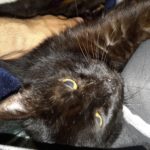
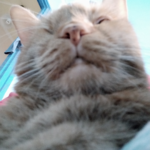
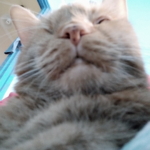

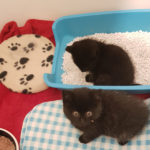
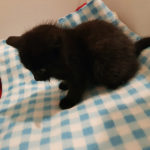

My cat has the skin issue on side of his nose n eye
Hello,
I’m sorry but we need a better description to help provide some direction. Please provide a photo. Your vets notes and all treatment options tried so far. Also is your cat indoor or out? Vaccinated? Any preventatives used? Etc
I provided 2 photos of my cat with his issue…And hes totally indoors..Hes had all the vaccinations that The VET would give..I have told the VET ever since I had him from a kitten..to give him every vaccination that he could to prevent any disease etc..Yes hes up to date..The VET put him on Famciclovir..I think it was compounded..But this was like months ago..n that area was REALLY bad..n the VET told me he didn’t want to keep giving him stuff…to do a wait OUT period n NOT stress him out by bringing him to the VET as often as I was doing…Like two times aweek..at one point..said i may be STRESSING him out n NOT giving him a chance to heal with the medication…That was 6 or more months ago..n YES his area on side if face n eye is ALOT better than it was..but never could find out what it was
..Vet did bloodwork..a scraping..n nothing showed up..n shined a light to see if it was ringworm…n that was negative…
Skin Issue on side of my cat’s face n eye
Could someone in the staff area PLEASE explain to me how the posting pics n asking questions is applied on here..Ive posted question n pics but im beginning to wonder if im doing it right on here..Cause that’s been couple days ago…n I need to know if its seen or not…I just joined couple days ago..so maybe im not doing it right.or something..HELP
I provided information..why am I not getting a response
..